The current model of education was designed for an Industrial Age, where the goal was to produce large numbers of workers with the same basic skills, knowledge, and attitudes. This model relies on structure, standardisation, and compliance:
Students sit at desks, facing the front while the teacher explains, instructs, and sets assignments.
Student progress is year by year, based on age not ability, and with little opportunity to engage individual interests.
The school day is divided into blocks in a repetitive weekly schedule that focuses on working efficiently and conforming to set standards.
Education today must prepare students for a future in a rapidly changing world and the current system is falling short. It is our belief that an educational approach that is flexible, adaptable, and focussed on developing the Knowledge, Capabilities & Self-development of the individual is critical to our students’ success in the modern world.
is developed through the core curriculum of English, Maths, Science, Religious Education, HSIE, PE, Creative Arts & Technology.
are developed through the integration of complex competencies, including Critical Thinking, Learner Agency, and Collaboration.
Students develop a greater sense of who they are and what’s important to them through interest electives, passion projects, finding their SIM (Strengths, Interests & Motivations) and Wellbeing.
Future Facing aligns with our commitment to nurturing agile empowered, and engaged students. 2024 will see a redesign of the traditional timetable that draws on research around ‘Best Use of Time’ in education. The new school schedule is designed to enhance the core curriculum by offering more choice, flexibility and independence around learning, as well as more opportunities for students to engage in interests and develop a strong sense of who they are.
The timetable will move beyond current educational constructs, creating a dynamic environment that supports Face to Face Learning, Best Use of Time, Flipped Learning and Wellbeing. We foster an environment where students can acquire the core skills, capabilities, and self-awareness to prepare for a successful real-world future.
Face to Face Learning (F2FL) with a teacher in a classroom is fundamental to educational achievement. Future Facing will in no way impact the quality of F2FL students receive at Chevalier College.
Best Use of Time (BUoT) refers to a transformative educational concept that sets out to ensure students get the most out of every week by reducing disruptions to learning.
Flipped Learning refers to students working individually outside a traditional classroom structure. This may be preparing for F2FL by completing pre-reading texts, watching a video or accessing planning resources.
Future Facing will support and enhance our wellbeing program. Starting in 2024, Chevalier will integrate Wellbeing lessons every week for students in Years 7-10.
Face to Face Learning (F2FL) with a teacher in a classroom is fundamental to educational achievement. Future Facing will in no way impact the quality of F2FL students receive at Chevalier College. In fact, F2FL will be enhanced by a learning cycle that allows for better preparedness for lessons, fewer interruptions, and greater opportunities for deeper learning.
At Chev, we pride ourselves on educational excellence, highly skilled teachers and offering an exceptionally varied curriculum. Our teaching staff are fully committed to our new approach and invested in its success.
Best Use of Time (BUoT) refers to a transformative educational concept that sets out to ensure students get the most out of every week by reducing disruptions to learning. Through addressing disruptions and rethinking the traditional timetable, BUoT can deliver:
Flipped Learning refers to students working individually outside a traditional classroom structure. This may be preparing for F2FL by completing pre-reading texts, watching a video or accessing planning resources. The outcome of completing this surface level learning before F2FL is that classroom time can be dedicated to interactive, hands-on activities and deeper, personalised learning and collaboration.
Flipped Mondays at Chevalier College will assist students to:
Future Facing will support and enhance our wellbeing program. Starting in 2024, Chevalier will integrate wellbeing lessons every week for students in Years 7-10. This tailored program will emphasise specific wellbeing areas and strategies relevant to each year group, occasionally sharing common modules differentiated for each year group.
This program will directly connect with ‘SIM’, a positive psychology approach for each individual student to more deeply know and apply their strengths, interests and motivations and therefore enhance their overall wellbeing. The aim of this new initiative for wellbeing is to better use time for students to acquire the knowledge and skills to flourish as they navigate the challenges and opportunities of living in a rapidly changing world.
Future Facing will change the way Chevalier students learn, creating a contemporary educational experience with Knowledge, Capabilities & Self-development at its core. By using time more effectively to maximise engagement and personal growth, students connect more deeply with their learning, acquiring complex capabilities and greater self-awareness to help them flourish in a rapidly changing world. Underpinning everything we do are our MSC values. We are MSC people, we are led by our hearts, and by our relationships with each other, and the world around us. Future Facing will better prepare our students for that world.
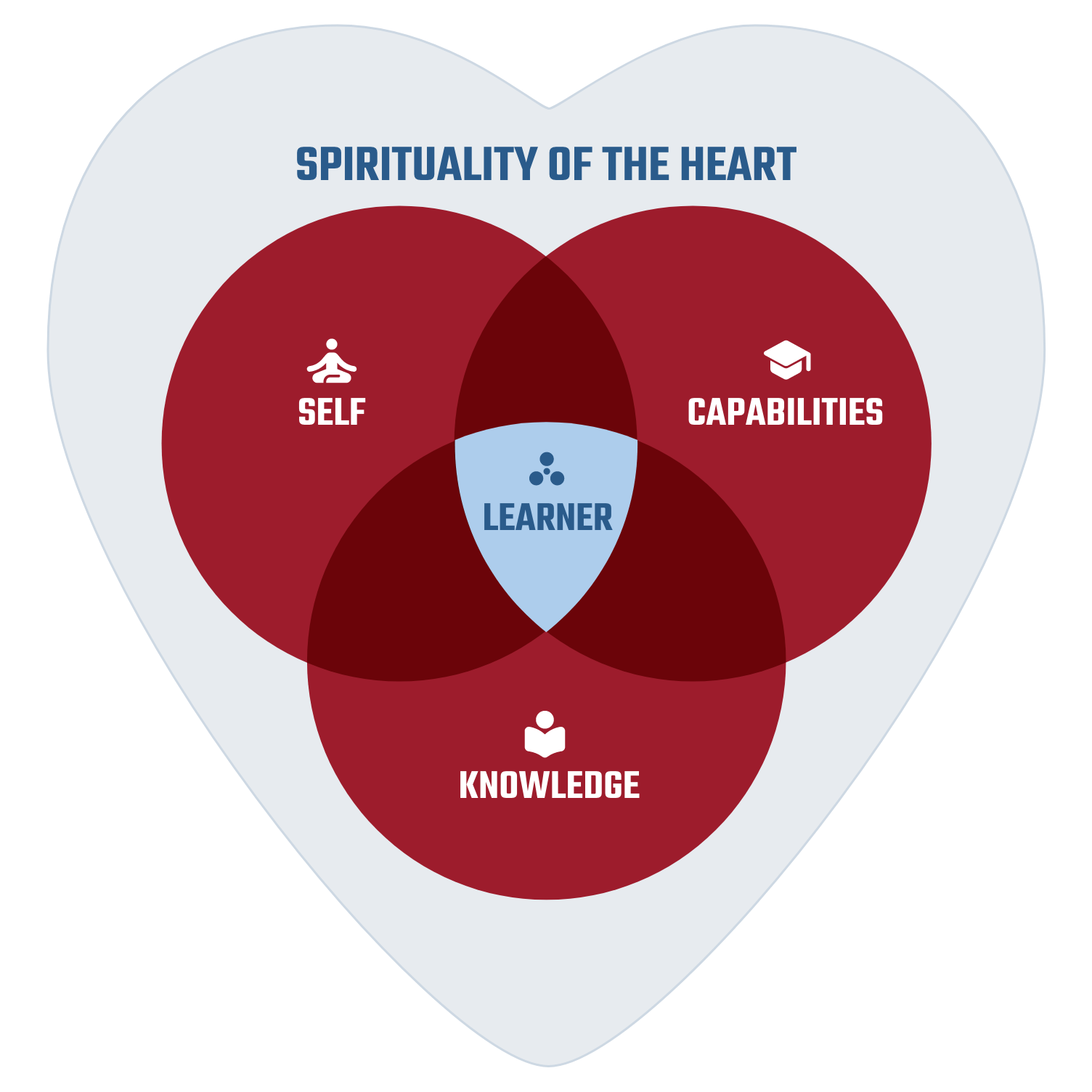
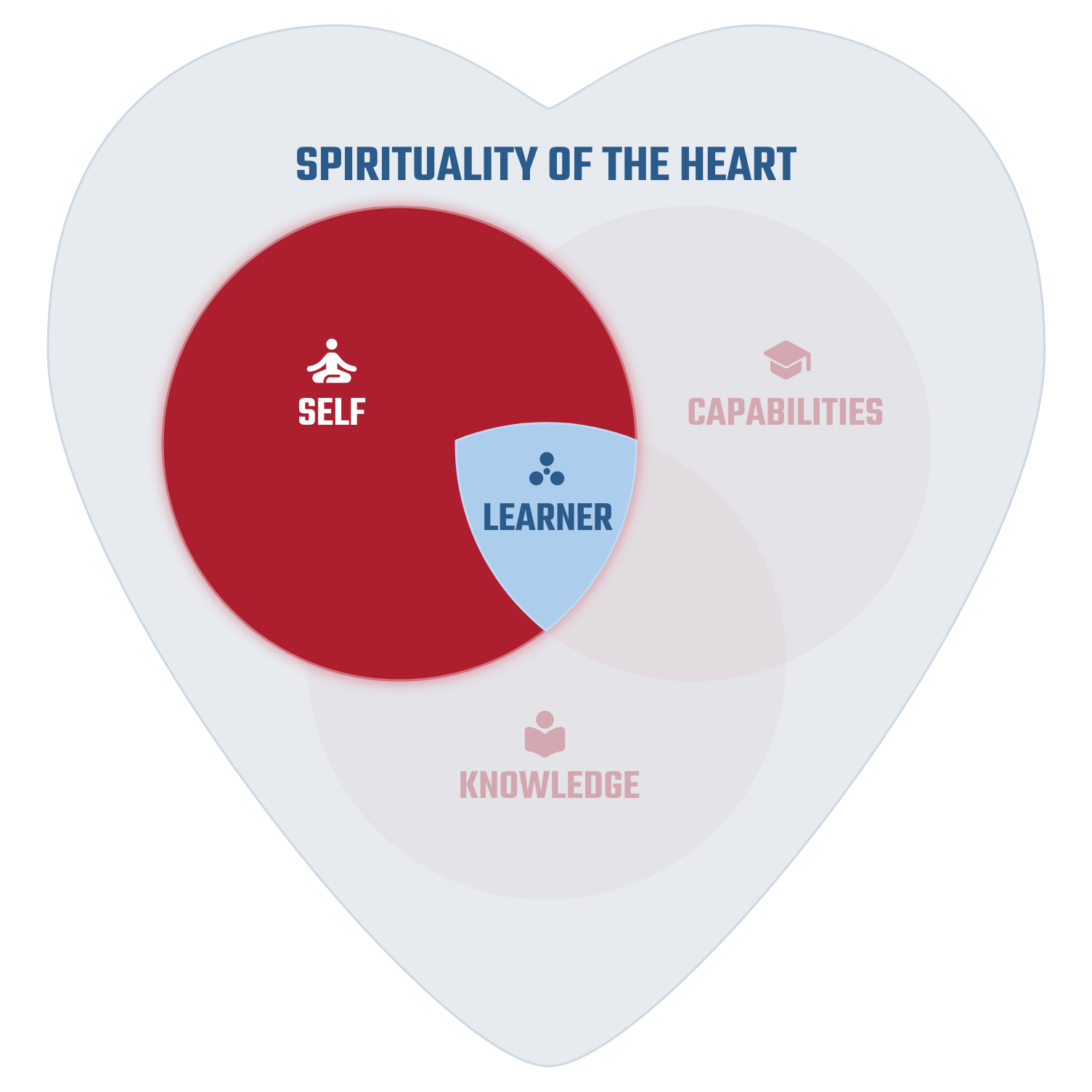
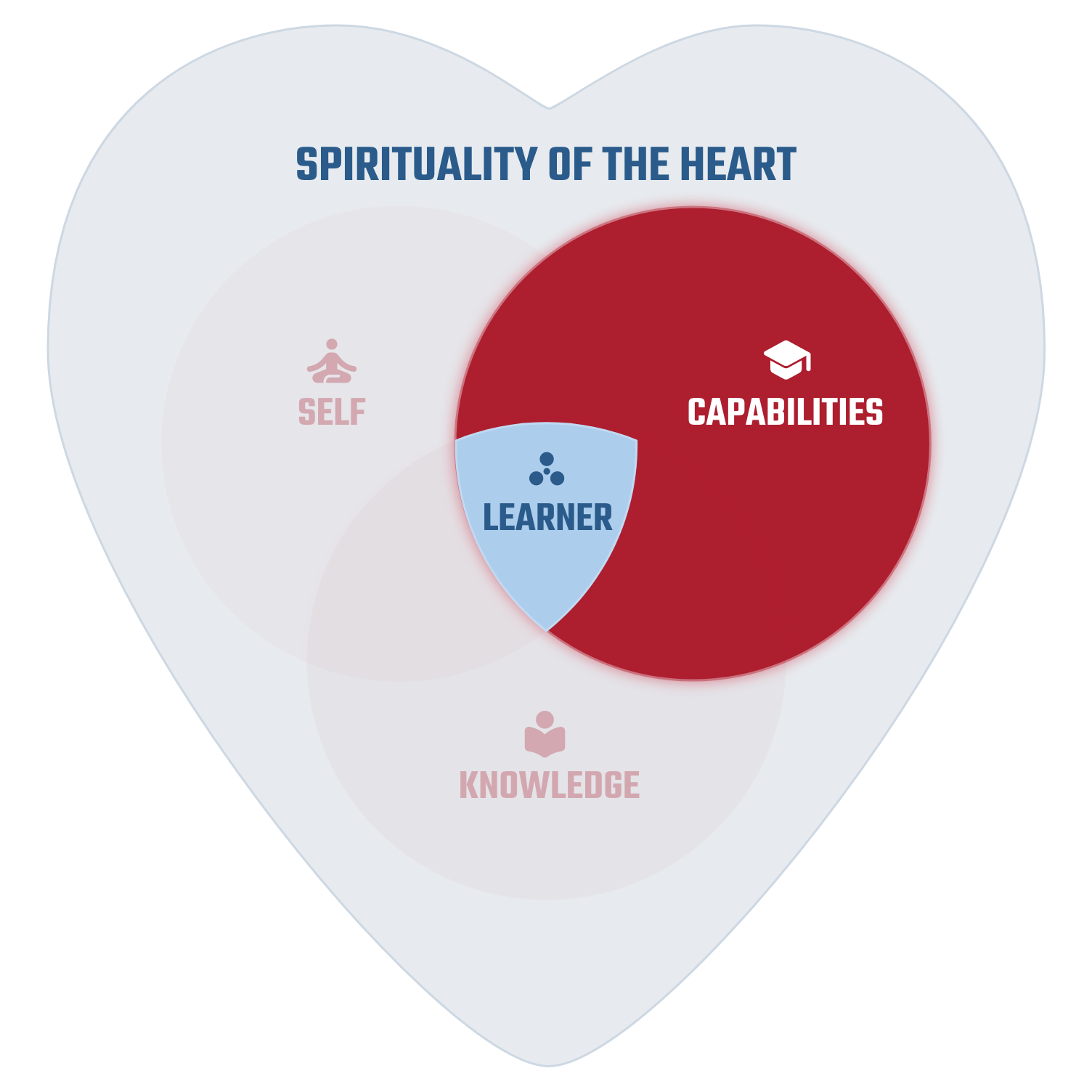
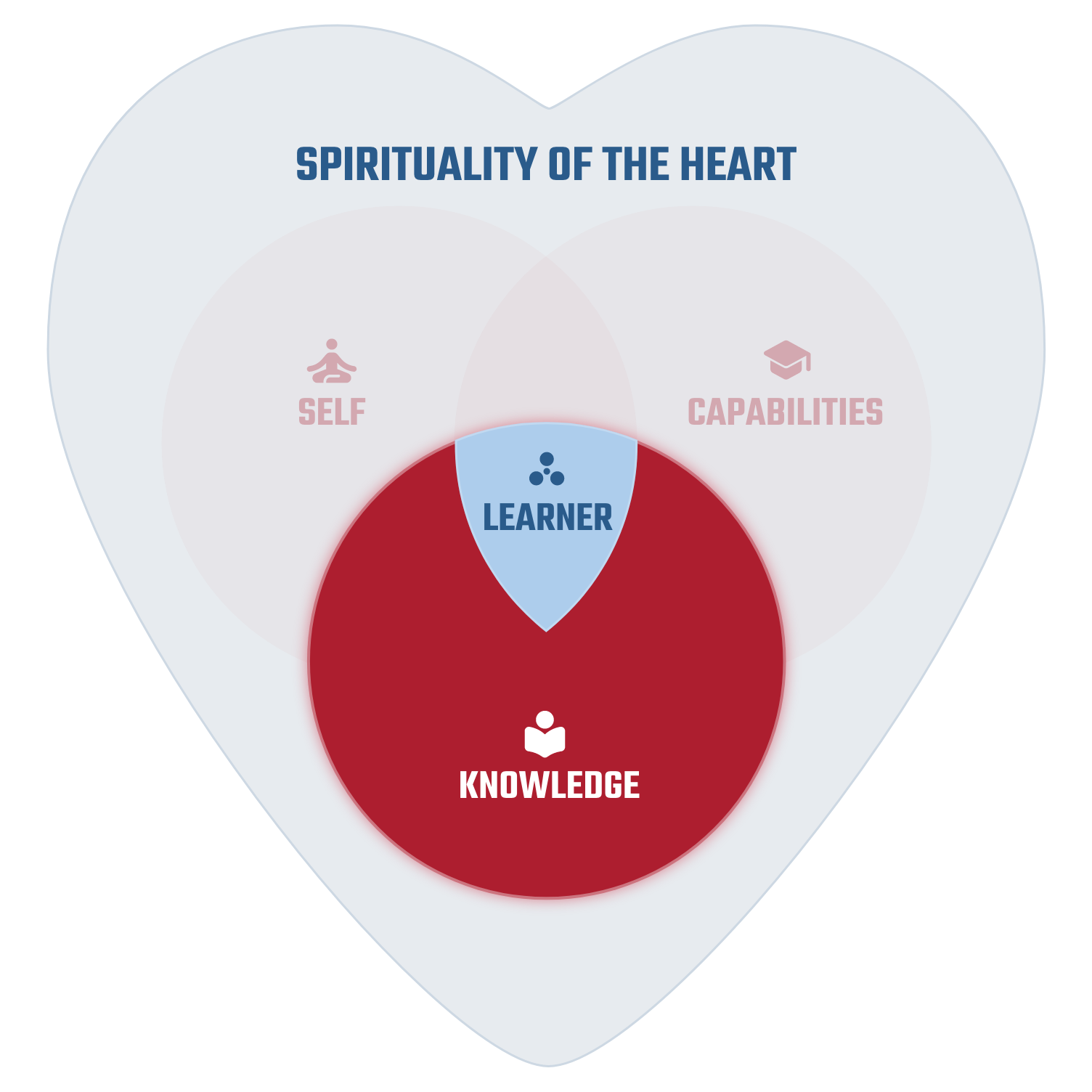
Achieving Educational Excellence
Our goal is that every student at Chevalier College can achieve their potential. Students develop knowledge through the core curriculum of English, Maths, Science, Religious Education, HSIE, PDHPE, Creative and Performing Arts and Technology. Chev ‘Future Facing’ complements excellence in the core curriculum by developing students with complex capabilities and an innate sense of self to help them succeed.
By reducing interruptions, we know that our students will have consistent access to their teachers for their face to face deeper learning. We also know that, historically, many of our highest performing students managed their time well by accelerating in some courses, allowing them extra time to focus on other courses in the HSC. As a result of the two factors above, and by broadening the concept of early commencement for all, rather than just some students, we believe academic performance measured via the ATAR will be maintained, if not enhanced.
We know that once students leave school, they need competencies and capabilities that cannot be learnt by just studying for a test. The new model, while enhancing academic performance, will also allow students to build complex capabilities and their sense of self; skills they need as they enter life beyond school.
Developing Complex Competencies
In 2023 we partnered with the University of Melbourne Assessment community.
Melbourne Assessment has developed new ways to assess and credential the complex competencies that learners need to thrive now and in the future.
Melbourne Assessment supports educators to confidently teach, assess, report on and credential the complex competencies learners need to thrive at school and beyond.
Part of the partnership is to measure and recognise a growing range of complex competencies essential for success in the modern world. Over the course of the partnership, we will begin to develop student skills and capabilities in the areas shown below with our focus for 2024 being ‘Learner Agency’ (also referred to as ‘Agency in Learning’). Over coming years, students will graduate from Chev with an ATAR/HSC along with a portfolio of assessed complex competencies.
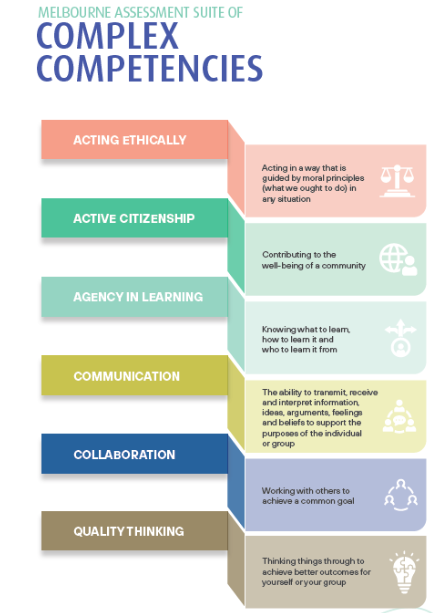
Learner Agency
Learner Agency is the first of a series of complex competencies we will focus on at Chevalier College. We see the development of skills in this area as integral to our students taking full advantage of ‘Chev Future Facing’ in 2024.
Learner Agency is knowing what to learn, how to learn it and who to learn it from. Self-regulated learning encourages students take charge of their learning process, setting goals, managing their time, and monitoring their progress. Flipped learning is where students engage with ‘pre-class’, surface level content and arrive to class ready for deeper learning activities. Flipped learning is one strategy which encourages self-regulated learning.
Work on Learner Agency is already underway via the following programs and activities.
A fundamental sense of self
By embedding positive psychology and wellbeing subjects directly into the timetable, we emphasise the importance of engagement, choice, and mental and emotional health. Students develop an innate sense of who they are and what’s important to them through interest electives, passion projects, SIM (Strengths, Interests & Motivations) and the Chev Wellbeing curriculum. The outcome of making time for self-development is resilience, a deeper engagement in their educational journey and an emerging sense of purpose.
“What is it you plan to do with your wild and precious life?” – Mary Oliver
Learn more about the content around My Design and SIM that Years 7-10 will have timetabled from 2024.
What will Chev Future Facing look like for my child in 2024 and beyond?
Next page